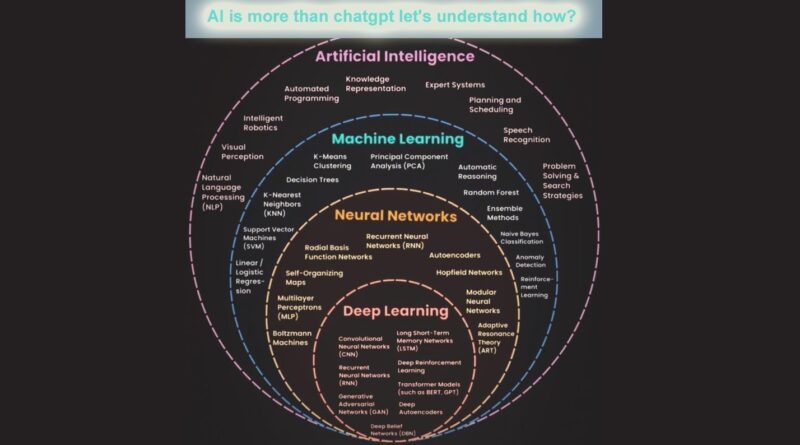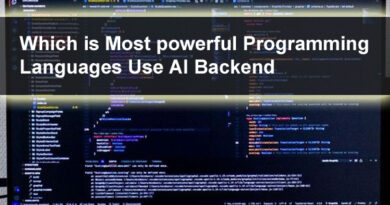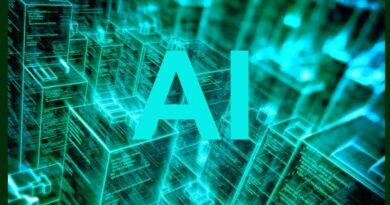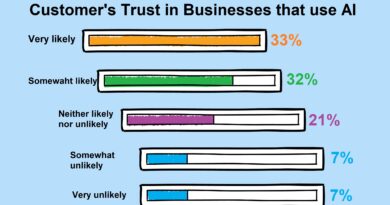AI is more than chatgpt let’s understand how?
Understanding AI: A Few General Tidbits
It’s quite silly to reduce AI to mere ChatGPT though. While ChatGPT is one of the greatest in the world today, AI is more than chatgpt it is only a small component of what artificial intelligence is.
AI is a wide category and does not represent only conversational agents but is rather a vast pool of technologies and systems.
Computer Vision AI is more than chatgpt
AI is growing towards greater sophistication in the field of computer vision, AI is more than chatgpt where machines gain the ability to recognize and comprehend pictorial information in the universe.
Some uses include image recognition, medical imaging, self-driving cars, and surveillance. Today, using deep learning methods, AI can recognize objects, use face recognition, and define abnormalities on medical images, which means that AI is not only ChatGPT.
Natural Language Processing (NLP) AI is more than chatgpt
Apart from the chatbots like ChatGPT included in the models of NLP, it encompasses a wide range of applications such as language translation, sentiment analysis, and text summarization .
Although current applications of AI are visible through chat interfaces, the actually capabilities of AI are far beyond that text analysis can be done at unprecedented scales with insights extracted and content can be created automatically.
Predictive Analytics AI is more than chatgpt
In the financial sector, health care, and marketing sectors, for instance, the application of predictive analytics based on artificial intelligence makes it easy for companies to anticipate trends and decide on necessary operations that can aid in optimizing the effectiveness of business execution.
By using history data the artificial intelligence systems generate new outcomes that help to holders become more effective and competitive. This capability shows that AI is not limited to conversational use cases such as ChatGPT only though it is quite popular for that.
Robotic Process Automation (RPA)
RPA leverages artificial intelligence to complete time-consuming tasks in any industry it operates.
Starting with data entry to invoice processing, customer service, and HR operations, AI based bots complement the efforts, eliminating redundancies, reducing errors, and allowing the human resource to focus on higher value tasks to make the case that, indeed, AI is much more than just ChatGPT.
Healthcare Innovations
The role that Artificial Intelligence plays for healthcare is enormous as AI can diagnose various diseases and create individualized treatment options.
The AI models involving patient information make better diagnosis, estimate an emergence of the disease, and prescribe proper treatments.
These innovations show how AI can benefit any industries and fields, not just conversation models like ChatGPT.
Chatgpt down
ChatGPT down” refers to instances when the popular AI chatbot experiences outages or technical issues. During these times, users may face difficulties accessing or interacting with ChatGPT. Stay updated on service status through official channels or support resources.
The evolution of Artificial Intelligence Technologies
AI is not only ChatGPT. Although the current trends are conversational models such as the ChatGPT, artificial intelligence is not limited to such models but a broader range of technologies and applications.
Knowledge of AI as a concept is essential to its optimization because AI is not solely about conversation or restricted to it.
Machine Learning and Data Analytics
Artificial Intelligence (AI) cannot be complete without machine learning (ML) since it makes the system to learn from data, and improve its operations on its own.
As with the help of ML, data can be analyzed to reveal trends, patterns, and relationships that are beyond human capacity to see.
This capability finds use in areas as diverse as health, where it may be used to forecast the incidence of epidemics, and finance, where it may be used to determine the best trading strategies.
Robotics and Automation
Another application of AI is in robotics and automation, which serves various purposes in increasing productivity and improving products in many fields.
Starting from robots manufacturing products to drones evaluating the status of agricultural fields, AI Automation eliminates the need for labor, cuts down on mistakes, and optimizes efficiency.
Semi-autonomous robots with AI can do routine tasks in the service industry freeing up human time to undertake higher value tasks.
AI in Personalization and Recommendations
AI can observe user behavior and make smart recommendations based on their likes and dislikes.
It is currently employed in e-commerce, online streaming services, and social media applications.
For instance, retail recommendation systems assist consumers to find products, movies, and content they may like to purchase or watch, improving on the user experience.
Beyond ChatGPT: Hence, I will discuss the following categories of AI applications:
AI is not limited to ChatGPT, but it is expanding to several fields and sectors. Although what ChatGPT is designed for is conversational AI, the potential of AI is not limited to just the text generating ability.
Healthcare
AI technology in healthcare is taking the world by storm as it offers various applications including; predictive analysis, diagnostics, and individualized treatments.
Computer programs powered by artificial intelligence can process large amounts of data to estimate epidemics, raise efficiency in treatment plans, and personalize the treatment processes.
Finance
AI approaches in the finance sector are not limited to ChatGPT.
They are used in fraud detection, algorithmic trading, and risk management.
Trading also involves the use of machine learning models to analyse financial transaction and detect fraud or suspect activities as well as enhance trading policies.
Manufacturing
Some of the stewardship activities of AI in manufacturing include predictive maintenance, quality assurance, and supply chain management.
It predicts equipment failures, guarantees product quality and optimises logistics flow.
Retail
Retailers use AI technology to offer customized offers, manage inventory levels, and even predict customer demand.
Through understanding on consumers’ behaviors and needs, AI assist retailers in achieving high level of customer satisfaction with low operational expenses.
Transportation
Transportation is an area where AI’s use can be revolutionary, ranging from self-driving cars to intelligent traffic control networks.
Self-driving automobiles employ artificial intelligence for driving and decision-making in real-time, on the other hand, smart traffic systems manage traffic progressively and lessen traffic jams.
Education
Beyond ChatGPT, AI is significant in education. They provide it with Intelligent Tutoring Systems, Learning Paths, and flexible Administrative Automation.
AI enhances learning processes by learning different approaches to teach various learners, and cuts costs incurred by tutors.
Entertainment
AI has a great impact on the entertainment industry due to content suggestions, generation, and consumer participation. AI helps in suggesting movies or series to watch next or shows you related to your preferences and AI creates novelty content.
AI in Healthcare: Changing the Face of Medicine
AI is not limited to ChatGPT. In the healthcare system, it is a versatile tool that changes the approach to patient treatment and medical studies.
When it comes to practical uses for AI, the possibilities are endless – from risk assessment to patient care.
Enhanced Diagnostic Accuracy
AI is not limited to ChatGPT in diagnostics. Sophisticated mathematical models read scans and diagnose diseases such as cancer and heart disease more effectively. This brings about early identification and enhanced benefits to patients.
Personalized Treatment Plans
AI is much more than ChatGPT when it comes to designing individualized plans of action. AI algorithms consider patients’ data, genetics, and behaviors to prescribe the most effective treatments.
This makes the interventions more effective since they are done based on the client’s individual needs.
Predictive Analytics in Healthcare
AI is not limited to ChatGPT and is very efficient in predictive analysis. AI systems predict diseases, admissions, and treatments.
This capability enables efficient resource planning and management as well as prevents adverse outcomes in patients.
Streamlining Administrative Tasks
AI is not limited to ChatGPT in the handling of administrative tasks. Computerization includes administrative functions such as patient appointments, charges, and records.
This saves much of their time and thus more time is given to attend to patients.
AI in Finance: Revolutionizing the Industry
AI is not just ChatGPT; it is a broad spectrum of technologies that are transforming the financial industry.
That said, let us remember that even though ChatGPT is an excellent conversational agent, the role of AI in finance is much broader.
Fraud detection and customer experience management are two areas where AI can be used to have significant impact.
Enhanced Fraud Detection
AI is not limited to ChatGPT when it comes to protection of financial transactions. It is possible for machine learning algorithms to work on massive data sets and flag signs of fraud.
These systems are dynamic and are learning hence being capable of fending off new complex threats more proficiently.
Automated Trading Systems
Another area where AI is more than ChatGPT is in automated trading. Computers have the capability to trade much faster than any human being due to the use of sophisticated formulas.
These systems are able to analyze the market trends and make decisions in real time including investment decisions and risk prevention.
AI in Manufacturing: Improving the efficiency
This means that AI is about much more than just ChatGPT when it comes to manufacturing.
In addition to the ability to engage in conversation as a tool in applications such as ChatGPT, AI is currently delivering massive changes in the ways manufacturing processes work including higher efficiency, lower costs, and improved product quality.
Predictive Maintenance
Here, the use of AI in manufacturing is not limited to automating work. Semi-autonomous and fully automated intelligent machines carry out predictive maintenance, which is the process of monitoring machineries and figuring out when they are likely to fail.
This approach saves a great deal of time and minimal costs of repairs and maintenance than any other methods hence more cycles for production.
Quality Control
Head mounted display: AI quality control systems are emerging in manufacturing industry where using a machine learning algorithm to recognize defects in real-time.
This improves the quality of the product and minimizes the amount of wasted production, proving that AI is not limited to ChatGPT since it offers more effective approaches to evaluating the quality of products.
Supply Chain Optimization
Optimization of the supply chain is essential in any organization and the applications of AI makes it possible.
It also uses artificial intelligence techniques to predict the level of demand and the right inventory management and timely delivery.
AI in manufacturing encompasses more than Chat GPT is evident in the discussed aspect where complex systems are enhanced for operations’ sake.
Robotics and Automation
AI is even beyond chatbot applications like ChatGPT when applied in contexts of robotic and automation in production.
Robots that are controlled by artificial intelligence get operationalized to handle recurrent duties that require precision and have large throughput than human workers for better and creative endeavors.
They state that this partnership between AI and human labor helps to increase general productivity.
AI in Education: The development of learning activities and teaching methods that are unique to an individual student.
AI is not just about the ChatGPT, It is rapidly revolutionizing education by offering one learning solution that meets the particular needs of every learner.
While, it is completely different from the conventional “one-on-one” teaching approach where students’ learning behavior, aptitudes, and deficits are taken into consideration to develop individual learning programs by AI tools.
Adaptive Learning Platforms
AI in education is not only about ChatGPT; adaptive learning platforms utilize AI-based algorithms that make tasks more challenging or less difficult based on the learner’s performance, thus avoiding the learner from being bored or challenged excessively.
Such platforms give real-time information that can assist an educator in evaluating and determining more precisely the needs of a certain learner requiring intervention or further extension of curriculum.
Intelligent Tutoring Systems
Moreover, far from being merely an oral interlocutor, AI is at work in intelligent tutoring systems that provide individual lessons.
These systems mimic the effect of having a personal tutor by explaining the content in detail, answering questions, and helping the students solve problems, all of which result in the students having a good understanding of the content being taught.
AI in Transportation: Self-driving Cars and Much More
AI can go beyond ChatGPT and is also involved in significant changes in some industries, especially in transportation.
The smart self-driving car is one of the best examples of the influence of Artificial Intelligence in transport. In this article, we focus on AI in the context of transportation and its applicability and effects in the sphere.
Autonomous Vehicles: That is why; The Future of Driving
AI is not just limited to ChatGPT, and its use in Self-driving cars proves colossal and wide-ranging.
Self driven cars employ artificial intelligence strategies such as, processing algorithms to drive on the roads, identifying traffic signals and making decisions instantaneously.
These vehicles use sensory systems and Ai algorithms to display safety and proficiency and lesser human intercession that can cause incidents leading to low crash rates.
Traffic Management: The AI Takes the-wheelAI goes beyond ChatGPT as it is present in traffic management systems implementing algorithms to solve the problem of congested roads and enhance traffic.
The traffic information is processed with the help of Artificial Intelligence to understand the pattern of flows and estimate the crowded periods; hence, the traffic lights indicate and control the flow of traffic and public transportation systems effectively.
This has the advantage of shortening the working week and making the commute, fuel usage, and pollution level more efficient.
That is why the paper focuses on separate ethical concerns in AI development.
In a broader role, AI is not just limited to ChatGPT. Although the availability of a refined and socially acceptable language that ChatGPT offers has attracted a lot of focus amoungst users, ethical issues in AI development do not begin or end with this one product.
This is also why it becomes paramount to fixate on various ethical questions to ensure that the processing power of AI does not go to waste.
Bias and Fairness
AI goes beyond what ChatGPT is at this moment; however, there is no denying the fact that every single AI system – be it a language model or anything else – is capable of biases.
To maintain the fairness of code the data source and algorithms used should be periodically scrutinized to ensure they do not have any embedded prejudice that leads to discrimination of vulnerable groups.
Privacy and Security
ChatGPT is just an application of AI, and as there is an improvement in the development of the technology and implementation, there arises issues concerning privacy and security.
Security, or the lack of it, is a key to trust, particularly when a user is entrusting personal data to a specific app.
Due to the confinement of data to certain developers its essential to put measures that will enhance the protection of the data from misuse.
Future Prospects: What Future does AI Have
AI is beyond ChatGPT as it is a powerful tool in many fields. It covers a broad range of technologies going beyond conversational agents and includes a myriad of other technologies altering industries.
AI applications are as big and diverse as the markets where they can be implemented – from healthcare to finance.




